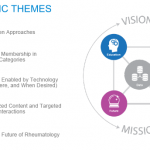If you don’t know where you are going, you are certain to end up somewhere else. —Yogi Berra
Why Make a Plan?
The ACR has a long history of strategic planning. As the ACR celebrates its 75th anniversary this year, we prepare to embark on another comprehensive self-assessment to reevaluate our strengths and weaknesses and our successes and challenges, with the goal of identifying those activities that will advance our specialty and provide the most value to our members.
The core strength of the ACR is its people. It is the professional organization for rheumatologists of all stripes, as well as for numerous disciplines of rheumatology health professionals. The collective wisdom of so many diverse talents and perspectives, all serving a common mission, greatly strengthens our organization. Of course this core strength also comes with important challenges. In order to represent such a diverse membership, the volunteer leadership of the ACR must itself be diverse and must commit to learning about and supporting the needs of all of our members, not just a subset. And the ACR must commit to creating a varied and diverse suite of programs and services with the goal of providing the maximum possible benefits for the maximum possible number of members, given the available resources. Moreover, we must have the flexibility to respond to a wide variety of member needs. For example, in recent years the needs of the rheumatology specialty have expanded significantly, requiring more practice support, more focused advocacy efforts, and programs to respond to pending quality-reporting requirements, among others—and the ACR responded to those needs. These challenges underscore the critical importance of disciplined strategic planning.
ACR STRATEGIC PLANNING COMMITTEE
Antony Rosen, MD, Co-Chair, Johns Hopkins University
Audrey Uknis, MD, Co-Chair, Temple University School of Medicine
Erin Arnold, MD, Illinois Bone and Joint Institution
David Borenstein, MD, Arthritis and Rheumatism Associates
Lenore Buckley, MD, MPH, VCU School of Medicine
Stanley Cohen, MD, St. Paul University Hospital
Leslie Crofford, MD, University of Kentucky
Kathryn Dao, MD, Arthritis Consultation Center Rheumatology
David Daikh, MD, PhD, VA Medical Center – Rheumatology
Pamela Degotardi, PhD, Queens College CUNY Honors
Linda Ehrlich-Jones, PhD, RN, Rehabilitation Institution Chicago
Peter Embi, MD, University of Cincinnati
Joseph Flood, MD, Musculoskeletal Medical Specialists
Richard Furie, MD, North Shore LIJ Health System
Sherine Gabriel, MD, MSc, Mayo Clinic
Karen Kolba, MD, Pacific Arthritis Center
Sharad Lakhanpal, MD, St. Paul University Hospital
David Lee, MD, Brigham and Women’s Hospital
James O’Dell, MD, University of Nebraska Medical Center
Steve Overman, MD, MPH, The Seattle Arthritis Clinic
E. William St.Clair, MD, Duke University Medical Center
Christy Sandborg, MD, Stanford Medical Center
Nora Singer, MD, Rainbow Babies and Childrens Hospital
Joan Von Feldt, MD, University of Pennsylvania
Michael Gallery, PhD, Facilitator, OPIS, LLC
Colin Rorrie, PhD, CAE, Facilitator, OPIS, LLC
Members from all backgrounds will be involved in every step of this strategic planning process. In the past couple of months, interviews have been conducted with a variety of members, including solo practitioners, members in small group practices, and members at large academic medical centers; clinicians and laboratory scientists; and clinical investigators, educators, and administrators—and everyone in between. In addition, we have surveyed all members who currently volunteer for the ACR and we have assessed ACR staff activities. Members of the ACR/ARHP strategic planning committee will include a mix of current volunteer leaders and members who have not been previously involved in the ACR’s activities.
In addition to our volunteer leaders, the ACR has engaged the assistance of a strategic planning consulting firm, OPIS, that will guide the strategic planning process. The facilitators who will work with the ACR were instrumental in creating the “7 Measures of Success” methodology, a strategic planning guide designed specifically for professional associations. We believe that adopting this approach in the ACR’s strategic planning will be extremely beneficial to the organization.
Some Things Will Never Change
For 75 years, the ACR has focused on advancing the specialty of rheumatology. That is the fundamental motivation behind all of our activities. That will never change, so you can rest assured that many of the key programs and services the ACR provides will remain in place, just as they have following previous strategic planning reviews. We will continue to host the premier, worldwide rheumatology scientific meeting annually and we will continue to be the preeminent source of continuing rheumatology education. We will also continue to proactively advocate for our members and support them in practice.
Based on previous strategic planning reviews and our volunteer leaders’ recognition that quality-of-care initiatives and globalization were important trends affecting our professional lives, the ACR created new programs on quality and international relations. Now, with the rapidly changing healthcare environment and the promise of imminent reform, we will redouble our efforts to stay abreast of emerging trends in medicine and will continue to listen to our members, to ensure that we can help you prepare for the future.
What Is New?
As with every strategic planning exercise, some activities will likely be replaced by new activities that are judged to be more valuable to members. While we will not know what those will be until the strategic plan is complete, I can assure you that any changes will be made with broad input from members and with the goal of providing the most value to members.
Although several issues will likely emerge during the course of this strategic planning exercise review, we are targeting a few topics for special emphasis. One important new goal will be to sharpen the strategic focus of the ACR, which means reducing the number of objectives but ensuring that strategies are more effectively and more rapidly implemented to accomplish those objectives. Another goal is to strengthen the partnership between the ACR and the ARHP. Rheumatology health professionals are vital to the specialty and the ACR will determine how to better integrate the perspectives of our health professional members into ACR activities. This will reinforce the ACR’s belief in an interdisciplinary team approach to rheumatology—an approach that is becoming increasingly recognized as the key to enhancing practice effectiveness across all medical disciplines. A third goal is to more closely integrate the work of the ACR/ARHP with that of the REF. In order to facilitate this integration, the strategic planning review for the ACR/ARHP will occur in concert with that of the REF. This will ensure that the two organizations’ future plans are aligned, that they collaborate more effectively, and that they avoid any duplication of effort. Finally, given the economic challenges of the time, the ACR will work to accomplish its goals as efficiently as possible, ensuring that we provide the best value to members, given our limited resources.
How the Strategic Plan Will Affect You
The final plan will be approved in October 2009, and you should begin to see the changes based on the plan in early 2010. As with previous plans, success will be measured by benchmarking against defined metrics and achieving the specific goals outlined in the plan, not by simply carrying out the tasks specified in the plan.
Because we are just now embarking on the strategic plan review, now is a great time to provide your feedback to the ACR regarding its programs and services, what you find valuable, what you believe needs improvement, and anything else that may be on your mind. In particular, if there are new initiatives that you believe would add value to ACR members and should be considered in our strategic plan, please let us know. The involvement and support of our members have allowed the ACR to successfully advance the rheumatology specialty over the past 75 years, and it is your continued involvement and support that will push us even further over the next 75 years.
Dr. Gabriel is president of the ACR. Contact her via e-mail at [email protected].
REF STRATEGIC PLANNING COMMITTEE
E. William St.Clair, MD, Chair, Duke University Medical Center
Abby Abelson, MD, Cleveland Clinic Foundation
Leigh Callahan, PhD, University of North Carolina
Stanley Cohen, MD, St. Paul University Hospital
Leslie Crofford, MD, University of Kentucky
Gary Firestein, MD, UCSD School of Medicine
John FitzGerald, MD, MPH, MBA, UCLA Medical Center
Ellen Gravallese, MD, University of Massachusetts Medical School
Emily Isaacs, MD, Fort Worth Clinic PA
Nadine T. James, RN, MSN, PhD, William Carey University
David Karp, MD, PhD, UT Southwestern Medical Center
Stuart Kassan, MD, Colorado Arthritis Associates
Betsy and John McLinden, Within Our Reach Campaign Volunteers and Donors
James O’Dell, MD, University of Nebraska Medical Center
Stephen Paget, MD, Hospital for Special Surgery
Laura Schanberg, MD, Duke University Medical Center
Michael Gallery, PhD, Facilitator, OPIS, LLC
Colin Rorrie, PhD, CAE, Facilitator, OPIS, LLC


